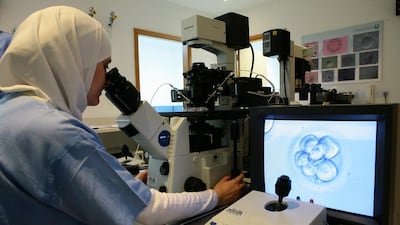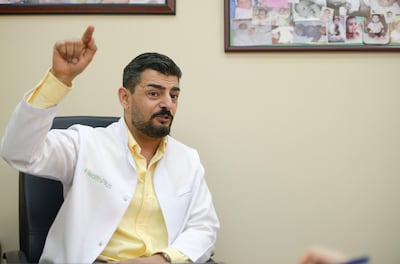Unmarried women and couples will soon be allowed to freeze their embryos and eggs following a Cabinet decision that will give more options to doctors and patients.
Hospitals had urged the government to relax legislation governing the procedure in recognition of the fact that women are having children later in life and that infertility - often linked to lifestyle diseases - is on the rise.
The practice of storing frozen embryos was banned in 2012 by the Ministry of Health, following a vote in the Federal National Council.
Since then, doctors have been able to apply to the Ministry of Health for exceptions on a case-by-case basis.
"The decision to allow embryo-freezing again in the UAE reflects the desire to accommodate various advances and keep abreast with all developments in these fields," said Dr Salem El Shawarby, director of Corniche Fertility Centre, part of the government-run Corniche Hospital.
The government is set to outline the exact criteria.
But some restrictions are expected to remain in place for unmarried women specifically.
Senior doctors said they expect only women undergoing chemotherapy or medical treatment that may harm their chances of conceiving would be automatically eligible for egg preservation.
In addition, unmarried women aged over 35 are expected to be entitled to the procedure.
An unmarried woman in her twenties, for example, would not necessarily be eligible.
Apart from the couples’ consent and proof of marriage, there will be no restrictions or conditions set for embryo freezing, Dr El Shawarby said. This may not be the case with unmarried women wanting to preserve their eggs.
The authorities are reluctant to encourage women to have children later in life, due to complications that arise and against a backdrop of slow population growth among UAE nationals.
It is estimated that 30 to 35 per cent of couples in the UAE have some form of fertility problem.
The overall fertility rate among Emirati women fell from 3.7 newborns in 2009 to 3.4 in 2014, a significant reduction in just five years.
“Embryo freezing used to be legal and then was stopped for a few years and now we are glad to hear that it has been legalised again,” said Dr El Shawarby, who in 2014 sent a nine-page paper to the government setting out the case for legalisation.
_____________
Read more:
Unmarried Emirati women are for the first time freezing their eggs
UAE medics see infertility rise driven by lifestyle diseases and late marriages
From the archives: Frozen embryos to be destroyed
_____________
Embryos stored at a younger age increase the chances of conception and reduces the cost of treatment for IVF. It also means there is often no need to overstimulate the ovaries, which means fewer side effects for mothers.
The centre, which is attached to the country's largest maternity hospital, has implanted more than 250 embryos since 2017 with a successful conception rate of 70 per cent.
“But each was done on a case-by-case basis and needed special, exceptional approval from the Ministry of Health. The new law will make way to further flexibility,” Dr El Shawarby said.
Dr Walid Sayed, medical director at HealthPlus Fertility Centre, said more young women are expressing interest in egg preservation, often those prioritising their careers or travelling abroad for further study, for example.
Last year, for the first time, a handful of unmarried Emirati women underwent the procedure, having secured special permission from the ministry.
“We have about 20 cases and it is increasing because it is not only about age, it is about ovarian reserve and this is a new marker. I have a 35-year-old patient and her ovarian reserve is low, so I recommended her to freeze,” Dr Sayed said.
Mohammed Al Shorafa, managing director of United Eastern Medical Services (UEMedical) said the Federal Law on Medical Assistance in Reproduction will also open new horizons for physicians.
“With this new law, couples wouldn’t need to travel abroad looking for international medical centres for fertility treatments or for eggs preservation," he said.
UEMedical has recently expanded its services with the opening of HealthPlus Fertility Centre in Dubai. Other centres have also expanded their services, with Corniche Hospital now offering fertility treatment to expats as well as Emiratis.
"With these new decisions, fertility services will expand significantly during the next phase, including opening new departments or centres and attracting the right talent," he said.


